Diagnosing mental illness accurately is complex due to varied conditions and individual experiences. Advanced data analytics and machine learning algorithms, coupled with community outreach programs, are enhancing diagnosis accuracy, particularly for Castle Rock Conduct Disorder (CRCD) through CRCD Therapy. This evidence-based approach focuses on family communication and community understanding, improving diagnosis reliability and fostering healthier environments, leading to better outcomes in conduct disorder treatment.
Mental illness diagnosis accuracy is a critical aspect of patient care, yet remains challenging due to complex symptoms and individual variations. This article delves into strategies aimed at enhancing diagnostic precision, exploring both traditional methods and innovative tools. We highlight the significant role of Castle Rock Conduct Disorder Therapy in improving diagnosis reliability, offering evidence-based practices that contribute to more accurate assessments. By understanding the challenges and adopting advanced techniques, healthcare professionals can better navigate the landscape of mental health diagnosis.
- Understanding the Challenges of Mental Illness Diagnosis Accuracy
- Innovative Approaches and Tools for Enhancing Diagnostic Processes
- The Role of Castle Rock Conduct Disorder Therapy in Improving Diagnosis Reliability
Understanding the Challenges of Mental Illness Diagnosis Accuracy

Diagnosing mental illness accurately is a complex task due to the diverse nature of conditions and individual experiences. The process often involves intricate assessments, where professionals must consider various factors to differentiate between similar symptoms. For instance, what appears as aggressive behavior in a child could be indicative of Castle Rock Conduct Disorder or underlying stress management issues. This complexity highlights the need for precise diagnostic tools and a comprehensive understanding of each patient’s unique journey.
Mental health policy analysis and advocacy play a pivotal role in enhancing diagnosis accuracy. By promoting research and awareness, these initiatives ensure that healthcare providers have access to the latest evidence-based practices. Encouraging open discussions about mental health, including positive thinking strategies, can reduce stigma and prompt individuals to seek help early on. Moreover, integrating innovative therapies like Castle Rock Conduct Disorder therapy into treatment plans contributes to more effective and tailored interventions.
Innovative Approaches and Tools for Enhancing Diagnostic Processes

In the pursuit of enhancing mental illness diagnosis accuracy, innovative approaches and tools are reshaping the landscape of Castle Rock Conduct Disorder Therapy. Beyond traditional methods, therapists now leverage cutting-edge technology, such as advanced data analytics and machine learning algorithms, to analyze complex patterns within patient behaviors and responses. These techniques enable more nuanced assessments, accounting for individual variations and potential cultural biases that might affect diagnosis.
Community outreach program implementation and public awareness campaigns development play a pivotal role in this progress. By educating both the public and healthcare professionals about mental health issues, these initiatives foster an environment where symptoms are recognized earlier and with greater clarity. Moreover, they promote self-esteem improvement by encouraging open conversations around mental illness, thereby empowering individuals to seek help without stigma or hesitation.
The Role of Castle Rock Conduct Disorder Therapy in Improving Diagnosis Reliability

Castle Rock Conduct Disorder Therapy (CRCDT) plays a pivotal role in enhancing the reliability and accuracy of mental illness diagnoses, particularly for conduct disorders. This evidence-based therapeutic approach focuses on improving communication strategies within families and communities, which is essential for early intervention. By fostering open dialogue and understanding, CRCDT empowers individuals to manage stress effectively and build resilience—crucial components in mitigating conduct issues.
The therapy’s impact extends beyond individual patients, strengthening support networks and promoting healthier environments. Through targeted interventions, CRCDT helps individuals develop adaptive coping mechanisms, enhancing their ability to navigate challenging situations. This proactive approach not only improves diagnosis reliability but also paves the way for more effective treatment plans, ultimately contributing to better outcomes in managing conduct disorders.
Mental illness diagnosis accuracy is a complex issue that requires innovative solutions. By understanding the challenges and adopting advanced tools like Castle Rock Conduct Disorder Therapy, healthcare professionals can significantly enhance diagnostic reliability. This therapy offers a comprehensive approach to navigating the nuances of mental health, ensuring more accurate and timely interventions for patients. Through these efforts, we move closer to a future where mental illness diagnoses are precise and effective.














